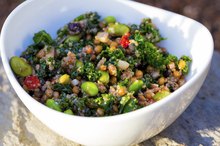Foods That Help Restless Legs Syndrome
Restless legs syndrome or RLS is a neurological condition that causes your legs to throb, pull or become so uncomfortable that it creates the urge to get up and move 14. RLS affects nearly 10 percent of the U.S. population and occurs more commonly in women than men, according to The National Institute of Neurological Disorders and Strokes 4. RLS usually strikes at night and can range from mild to severe. Aside from moving around when these symptoms appear, there are some foods that may you bring relief.
If you are experiencing serious medical symptoms, seek emergency treatment immediately.
Foods High In Iron
Restless legs syndrome often results from an iron deficiency so adding iron-rich foods may prove helpful in easing some of the painful or irritating symptoms, states MayoClinic.com 1. Iron is essential to human health. It assists in the transportation of oxygen throughout the body and helps regulate cell growth. The Office of Dietary Supplements at The National Institutes of Health suggest that a body low in iron often suffers from neurological disorders such as restless legs syndrome and may also experience fatigue, a weakened immunity and poor work performance 145.
Magnesium Rich Foods
Tingling in Hands and Feet and Low Magnesium
Learn More
Magnesium is another mineral that many people who suffer from restless legs syndrome seem to be deficient in 1. According to the University of Maryland Medical Center, magnesium has been shown to relieve RLS 2. In a study published in the August 1998 issue of "Sleep", Magdolna Hornyak MD and colleagues from the Department of Psychiatry and Psychotherapy from Albert-Ludwigs-University, in Germany found that magnesium relieved RLS symptoms for those that were experiencing moderate forms of it 2. Participants found the throbbing dissipated, their sleep improved and they did not have the urge to get up and move. LEF.org suggests that individuals that have RLS start by consuming 250 mg of magnesium per day. Good sources of magnesium include green vegetables such as:
- spinach
- legumes
- nuts
- seeds,
- whole unrefined grains
- Magnesium is another mineral that many people who suffer from restless legs syndrome seem to be deficient in 1.
- LEF.org suggests that individuals that have RLS start by consuming 250 mg of magnesium per day.
Foods with Folate
Folate is a water-soluble B vitamin necessary for the production of new cells including red blood cells and imperative to prevent anemia. RLS is directly related to a folate deficiency so eating foods high in folate and folic acid could relieve some or all of the symptoms individuals who have RLS experience. In a study published in the August 1976 issue of "The Canadian Medical Association Journal," M. I. Botez and colleagues showed that patients who suffered from RLS could find relief if they took 5 to 10 mg of folic acid per day.
Related Articles
References
- MayoClinic.com: Restless legs syndrome
- University of Maryland Medical Center: Magnesium
- Pubmed: U.S. National Library of Medicine National Institutes of Health; Magnesium therapy for periodic leg movements-related insomnia and restless legs syndrome: an open pilot study.
- Office of Dietary Supplements: Magnesium
- Office of Dietary Supplements: Iron
- National Institutes of Health (NIH). Restless Legs Syndrome.
- RLS & kids. Restless Leg Syndrome Foundation [internet].
- Silva GE, Goodwin JL, Vana KD, Vasquez MM, Wilcox PG, Quan SF. Restless legs syndrome, sleep, and quality of life among adolescents and young adults. J Clin Sleep Med. 2014;10(7):779–786. doi:10.5664/jcsm.3872
- Maheswaran M, Kushida CA. Restless legs syndrome in children. MedGenMed. 2006;8(2):79.
- Pigeon WR, Yurcheshen M. Behavioral Sleep Medicine Interventions for Restless Legs Syndrome and Periodic Limb Movement Disorder. Sleep Med Clin. 2009;4(4):487–494. doi:10.1016/j.jsmc.2009.07.008
- National Institutes of Health (NIH). Restless Legs Syndrome.
- Rajaram, S S, et al. Some Children With Growing Pains May Actually Have Restless Legs Syndrome. Sleep. Jun 2004 15;27(4):767-73.
- Ondo, WG. Restless legs syndrome. Neurol Clin - 01-NOV-2005; 23(4): 1165-85, viii.
Writer Bio
Kimberly Riggins has been writing in the health and wellness industry for over 15 years. Certified as a personal trainer at age 17, she also holds a Bachelor of Science in psychology, a Master of Science in holistic nutrition and certification as a holistic health counselor. Her background includes weight training, yoga, nutrition, weight management, body image issues and eating disorders.









